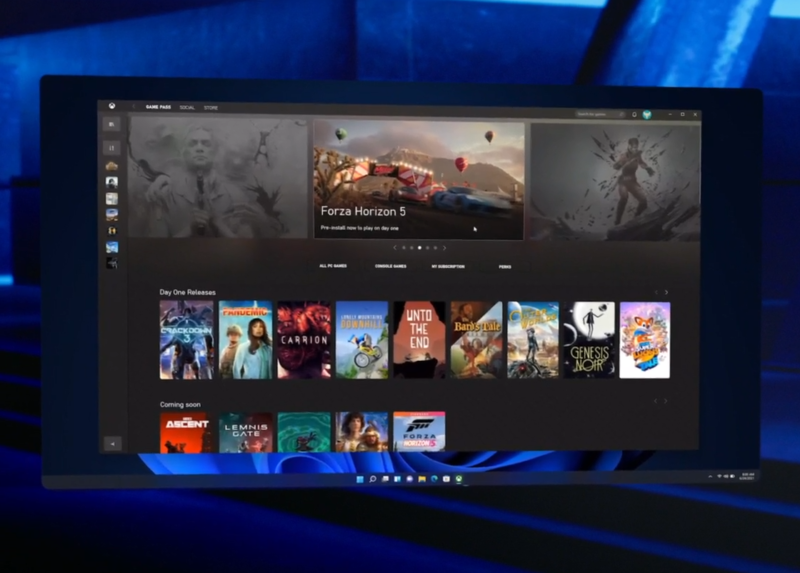
Like many of Microsoft's PC-specific announcements over the years, today's sprawling Windows 11 unveil included a gaming-specific component—and at least one with major, next-gen performance in mind.
Arguably the biggest component is DirectStorage, a DirectX 12 Ultimate API that had been previously announced (and then launched) as part of the Xbox Series X/S consoles. This API requires a higher-speed SSD drive, as it redirects I/O calls for 3D graphical assets directly to the GPU, and it leverages the higher average throughput of no less than PCI 3.0 speeds to do so at a rate that fast-moving software like games can take advantage of. This isn't just a matter of faster loading times. Visual elements like draw distances, texture variety, and instant asset introduction become possible, instead of having 3D worlds interrupted by narrow hallways, elevators, and other in-game trickery. With that boost, game makers can reimagine the scope of their virtual worlds.Today, we've learned that this API will land as a Windows 11 exclusive and will require substantial hardware to toggle. First, your gaming PC will need a compatible SSD, which Microsoft describes as "1 TB or greater NVMe SSD to store and run games that uses the 'Standard NVM Express Controller' driver." However, NVMe is a protocol, not a speed rating. And while we hope this means that NVMe PCI 3.0 drives will be compatible—since they're cheaper and more commonplace—we're still waiting for clarification on that point. (Xbox Series X/S both rely on drives rated for PCI 4.0 speeds.)
Second, you'll need a GPU that is compatible with the DirectX 12 Ultimate spec. That means nothing lower than the likes of the RTX 2000 and RTX 3000 series by Nvidia or the RDNA 2 line from AMD.
While the latter is a particularly intense PC requirement in a chip-shortage universe, it does line up with next-gen console performance. The asset-streaming power of PlayStation 5's Ratchet and Clank: Rift Apart is the best SSD showcase on either next-gen console at this point, and it ticks both of the above hardware-requirement boxes to deliver instant-loading dazzle when its heroes warp from universe to universe. (PS5 and XSX have very similar hardware, even if the APIs leveraged by their games differ.) And on Windows 11, DirectX 12 Ultimate will likely leverage other perks that come by default with Xbox Series X/S, including a more efficient texture-loading technique dubbed Sampler Feedback Streaming.
Auto HDR, Windows Store
And as more computer owners connect their PCs to higher-end displays, particularly with HDR compatibility, the gaming side will benefit hugely from one of Xbox Series X/S's niftiest party tricks: Auto HDR. This system relies on Microsoft's machine-learning data set to automatically tone map the color and luminosity data from older software, so that it renders at an appropriate level on TVs whose brightness maxes out at 1,000 nits and beyond. Having already tested the feature at length on Series X's older Xbox 360 games, I can report that the results generally look phenomenal (but are also easily disabled).
In great news, a video game on Windows 11 can fall back as far as the DirectX 11 API to tap into this system. Unlike the aforementioned DirectStorage API, Auto HDR has no listed hardware requirements beyond "an HDR monitor." This doesn't specify the spec, but we assume it's the simpler HDR-10 spec—which lacks the scene-by-scene metadata adjustments found in standards like Dolby Vision. But that's a small nit to pick for a system that automatically updates older games with bolder colors, brighter highlights, and superior contrast ratios.
Today's news about Windows Store upgrades is welcome, especially for people who must use that store to access Xbox Game Pass software. But at this point, the changes don't appear to be Windows 11-specific. Game Pass will work on Windows 11 the same way it works on Windows 10, either requiring the PC-specific subscription tier at $10/mo or the "Game Pass Ultimate" tier at $15/mo. (The latter adds game downloads on consoles and unfettered access to Xbox Game Streaming.) And new executable formats are going live on the current Windows Store, so we don't have to wait to get access to Win32 versions of games via Microsoft's interface. Software and game makers in kind don't have to wait for Microsoft to reduce its take on sales percentages, which already dropped earlier this year to 15 percent for apps and 12 percent for games (thus reaching parity with Epic Games Store).
Article From & Read More ( DirectStorage on Windows 11: Next-gen gaming performance, with PC requirements - Ars Technica )https://ift.tt/3wVpe73
Technology
Bagikan Berita Ini














0 Response to "DirectStorage on Windows 11: Next-gen gaming performance, with PC requirements - Ars Technica"
Post a Comment